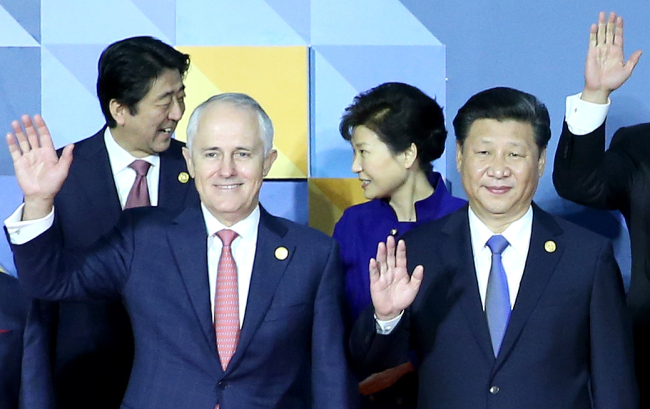Japanese Prime Minister Shinzo Abe has demanded the removal of a statue of a teenage Korean girl, a symbol of Korean victims of Japan’s wartime sexual slavery, as a condition for settling the issue involving the victims, according to a news report Thursday.
 |
| President Park Geun-hye (right, back row) talks with Japanese Prime Minister Shinzo Abe (left, back row) as they stand for a photo session at the Asia-Pacific Economic Cooperation summit in Manila, the Philippines, Thursday. (Yonhap) |
Citing a Tokyo official, the Japanese daily Asahi Shimbun reported that Abe made the demand during his first-ever bilateral summit with South Korean President Park Geun-hye at Cheong Wa Dae on Nov. 2.
Seoul’s Foreign Ministry said the report was “different from the truth.”
“We would like to refrain from divulging the content of the summit,” ministry spokesperson Cho June-hyuck told reporters. “We express regrets over the fact that there have been reports from Japan that are not true or distorted.”
According to the report, Abe called for the removal of the statue in front of the Japanese Embassy in Seoul and reiterated that the issue of the Korean victims — euphemistically called comfort women — has already been settled through the 1965 treaty that normalized bilateral ties.
The report also said that Tokyo is considering establishing a follow-up to the botched Asian Women’s Fund that Japan set up in 1995 for Asian victims, many of whom were Korean. It has also considered sending a letter from the prime minister to each of the victims, the report said.
The civilian-financed Asian Women’s Fund failed, as it was intended to show that Japan was taking “moral responsibility” for the past atrocity. It was dissolved as the victims called for “legal” reparations and apologies, not just financial compensation.
The statue, also known as “Peace Statue,” was set up in December 2011 by civic groups including the “Korean Council for the Women Drafted for Military Sexual Slavery by Japan.” The monument has been installed to highlight demands for Japan’s sincere apology and adequate compensation for the victims.
Since April 2014, the two sides have held 10 rounds of director-general-level talks on the comfort women issue. But no significant progress has yet been reported.
Japan has maintained the issue was already settled under the 1965 treaty. Article II of the treaty states the problem concerning property, rights and interests of the two contracting parties and their nationals has been settled “completely and finally.”
However, Seoul claims the issue was not on the agenda for the negotiations over the treaty at the time, given it was only in the 1990s that victims and civil society began raising the issue. It also claims it is a wartime human rights issue that should be dealt with separately from the treaty.
During the latest round of negotiations over the issue last Wednesday, the two sides failed to bridge their differences and decided to hold another round of talks “at an early date” in line with their leaders’ agreement to accelerate the negotiations over the issue.
There are 47 known surviving Korean victims, who are an average of 89.2 years old.
By Song Sang-ho (sshluck@heraldcorp.com)

